
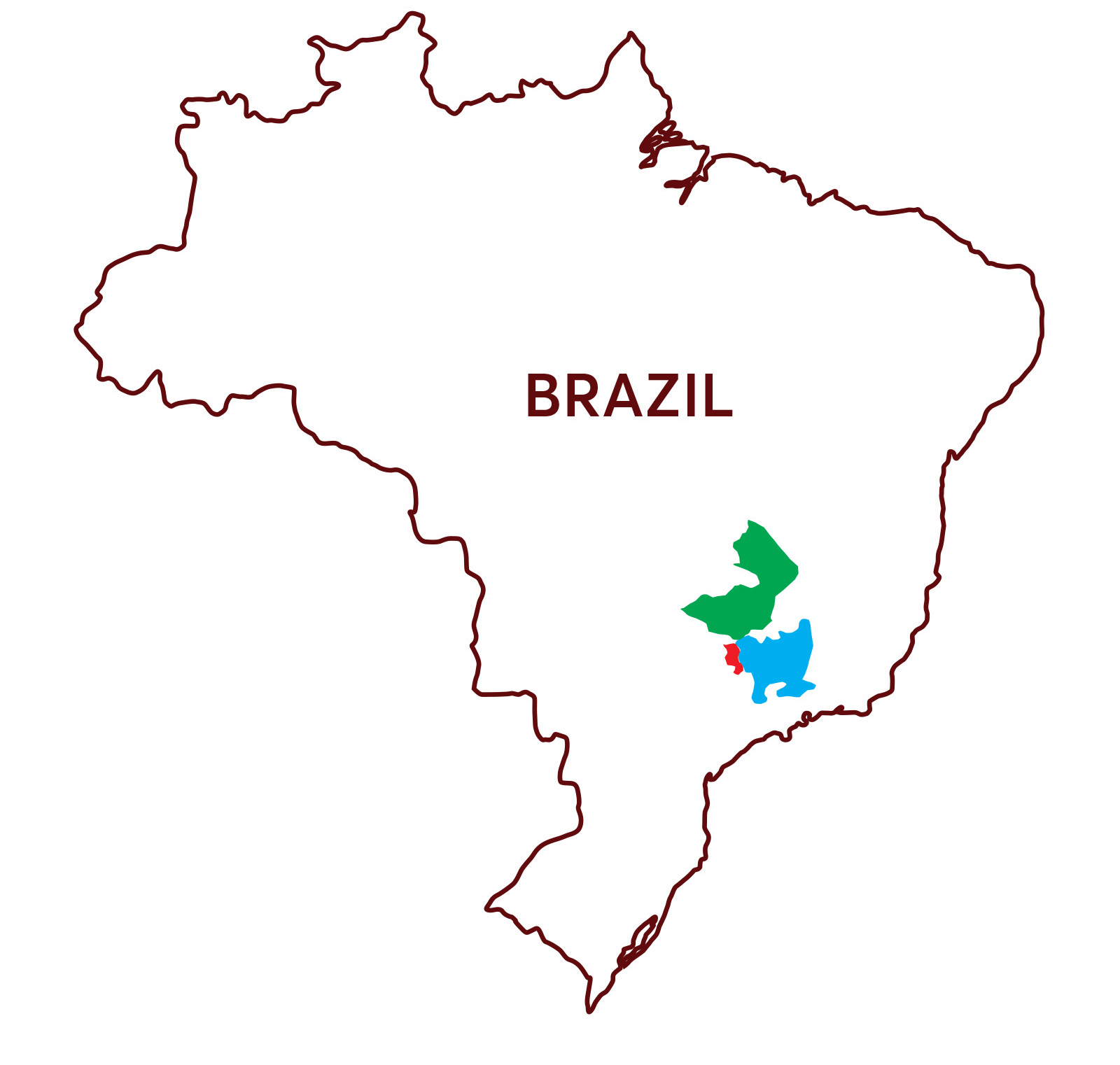
In Brazil coffee is grown in 3 main areas
Brazil is the world's largest coffee exporter with a variety of crops with complex tasting notes.
The farms are located on the mountainside (at 400m to 1600m above sea level) where the temperatures are steady all year-round with moderate sunlight and rain, ideal to grow Arabica and Robusta coffee trees.
The farms are located on the mountainside (at 400m to 1600m above sea level) where the temperatures are steady all year-round with moderate sunlight and rain, ideal to grow Arabica and Robusta coffee trees.
Jade Coffee has selected some of the best coffees grown in Alta Mogiana and South of Minas. Let's explore these two special regions.
Alta Mogiana is a traditional coffee growing region located in the northeast of the São Paulo state, bordering Minas Gerais state at an altitude of 900 to 1,000 meters. With an average annual temperature of 21 degrees Celsius, Alta Mogiana has a rich soil which, combined with the fresh water from Rio Grande river and its high altitude, make it an ideal place to grow coffee.
Skilled labor and excellent infrastructure have further increased coffee production in the region.
Tasting Notes: bright aroma, fruits combined with nuts and chocolate, comfortable acidity, long after tastes with caramel sweetness and dark chocolate.
Skilled labor and excellent infrastructure have further increased coffee production in the region.
Tasting Notes: bright aroma, fruits combined with nuts and chocolate, comfortable acidity, long after tastes with caramel sweetness and dark chocolate.

The region has 15 cities of São Paulo State (Altinópolis, Batatais, Buritizal, Cajuru, Cristais Paulista, Franca, ltirapuã, Jeriquara, Nuporanga, Patrocínio Paulista, Pedregulho, Restinga, Ribeirão Corrente, Santo Antônio da Alegria and São José da Bela Vista) and 8 municipalities of Minas Gerais State (Claraval, Capetinga, Cassia, Ibiraci, Itamogi, Sacramento, São Sebastião do Paraíso and São Tomas de Aquino).
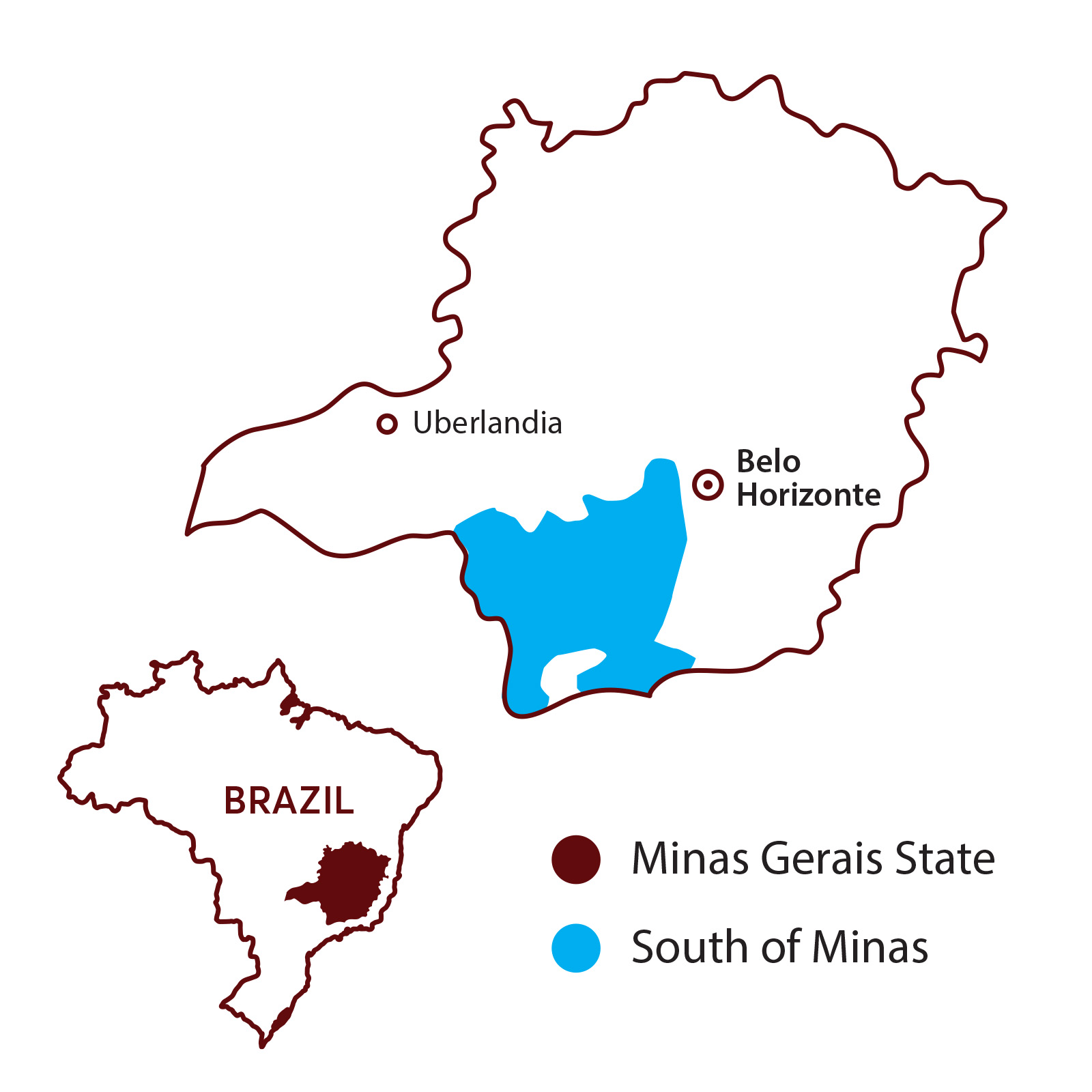
South of Minas Gerais state (Sul de Minas) is one of Brazil’s most productive coffee producing areas. Arabica coffee has been grown in this region since the 1850s and it is characterized by rolling hills, a mild climate averaging 23°C, and high elevations.
The mountainous terrain, reaching up to 1400m is suitable for growing coffees.
Although some of the largest coffee farms in Brazil are located in Sul de Minas, more than half of the region’s producers are small to medium-sized farms. Sul de Minas accounts for, on average, 30% of Brazil’s coffee production. Sul de Minas has increased production quality through investments in infrastructure and sustainability measures.
The mountainous terrain, reaching up to 1400m is suitable for growing coffees.
Although some of the largest coffee farms in Brazil are located in Sul de Minas, more than half of the region’s producers are small to medium-sized farms. Sul de Minas accounts for, on average, 30% of Brazil’s coffee production. Sul de Minas has increased production quality through investments in infrastructure and sustainability measures.
The most commonly cultivated varieties are Yellow Catuai and Novo Mundo, with some farms also growing Icatu, Obatã and Red Catuai. Most of the coffee produced here is processed as Natural.
Tasting Notes: full bodied, with low acidity and fruity aromas.
Tasting Notes: full bodied, with low acidity and fruity aromas.
Located in south-central Minas Gerais, Campo das Vertentes obtained the Geographic Indication in May of 2019. The region spans 25,000 hectares, comprises 17 municipalities and in 2018 produced 750,000 bags. Santo Antonio do Amparo is the heart of the region and is home to several of its best-known farms.
The rolling hills of south-central Minas Gerais produce coffees with flavors of chocolate and caramel, with a clean, sweet finish. While the region lacks the grandiose altitudes of the Mantiqueira de Minas, its climate is ideal for producing sweet, full-bodied coffees with rounded acidity. Several farms from this region are recent winners of the Cup of Excellence award and consistently place among the top finishers, including our partner Fazenda Guariroba.
Tasting Notes: Coffees from Campo das Vertentes are crowd-pleasers; chocolatey, sweet and full-bodied with fruity-flowery aromas and rounded acidity.
The rolling hills of south-central Minas Gerais produce coffees with flavors of chocolate and caramel, with a clean, sweet finish. While the region lacks the grandiose altitudes of the Mantiqueira de Minas, its climate is ideal for producing sweet, full-bodied coffees with rounded acidity. Several farms from this region are recent winners of the Cup of Excellence award and consistently place among the top finishers, including our partner Fazenda Guariroba.
Tasting Notes: Coffees from Campo das Vertentes are crowd-pleasers; chocolatey, sweet and full-bodied with fruity-flowery aromas and rounded acidity.
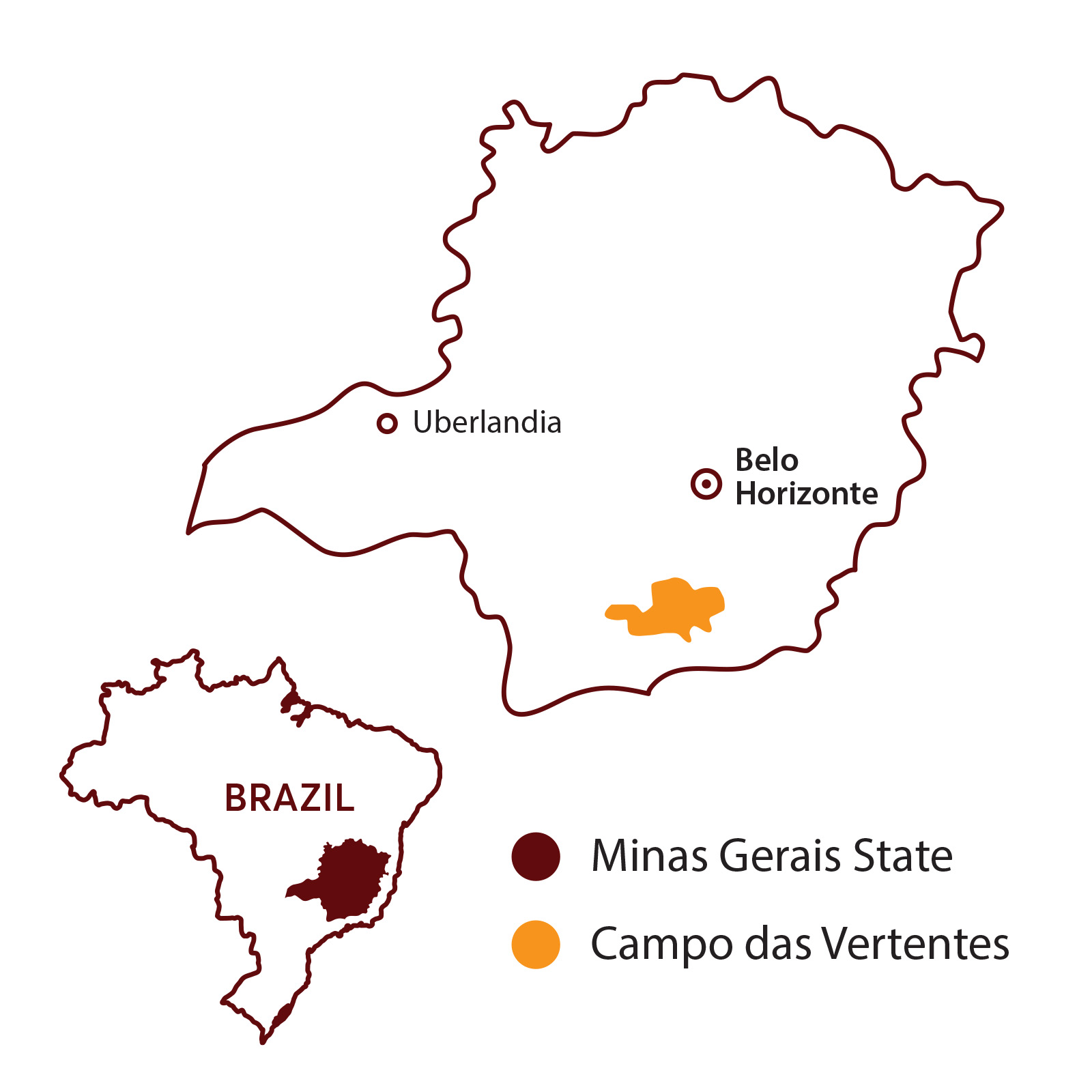
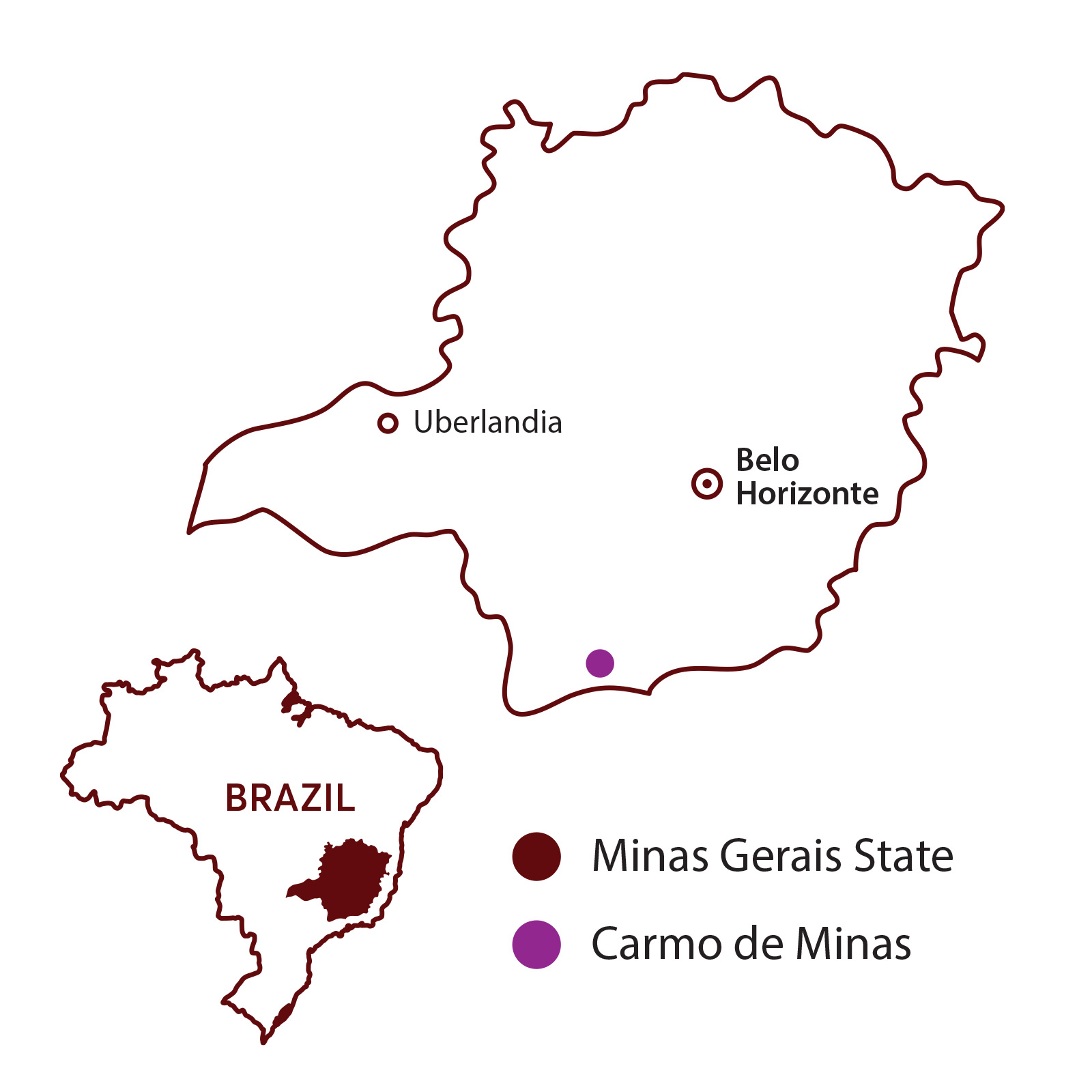
The city of Carmo de Minas is located in the southern region of Minas Gerais state, in Mantiqueira mountains, a region naturally endowed with unique conditions for the production of specialty coffees, with fertile soils, predominance of sunlight and altitudes ranging from 900 meters to 1500 meters. An area with exceptional terroir, which produces unique coffees year after year and became appreciated worldwide in quality competitions such as the Cup of Excellence.

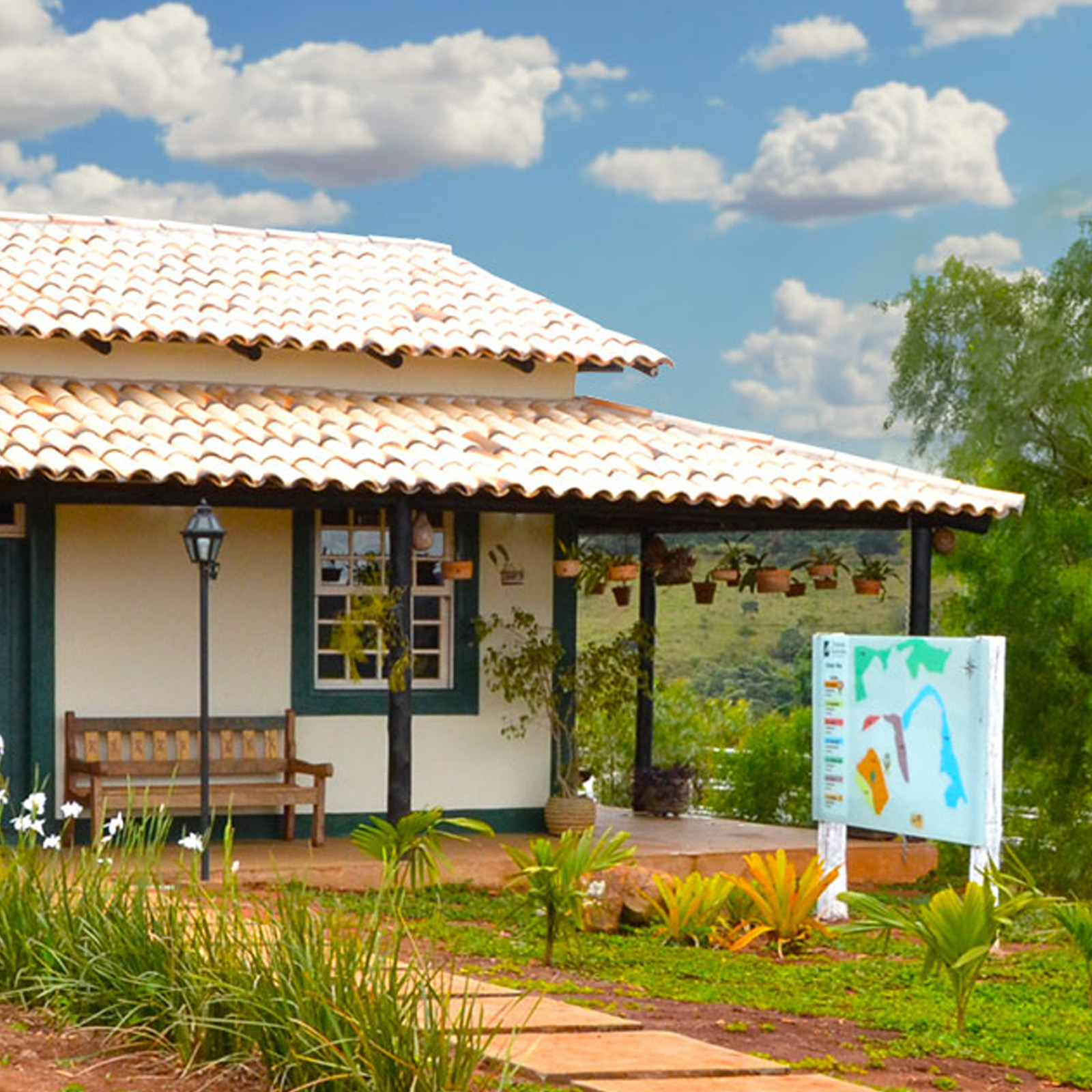
Fazenda Guariroba, owned by Homero Aguiar Paiva, is located in Santo Antônio do Amparo, Minas Gerais State, Campo das Vertentes micro-region.
Skilled labor and excellent infrastructure have further increased coffee production in the region.
The farm has 200 hectares in total area, 90 hectares for growing coffee and 20 hectares for natural reserve. The main coffee varieties are Yellow Catucaí and Yellow Bourbon.
Homero Aguiar Paiva belongs to a traditional coffee family. His father, Mr Afranio Aguiar Paiva was born at Cachoeira Farm. He graduated in Dentistry and years later dedicated his life to growing coffee following the family tradition. He also worked for many years at the Brazilian Coffee Institute (IBC).
Mr Homero Aguiar Paiva, a civil engineer and successful businessman with deep coffee roots, decided to invest in specialty coffee production. In 2009, he purchased a 200-ha land from Cachoeira Farm belonging to his uncle, Mr Fernando Aguiar Paiva.
Cachoeira Farm, built in 1840, is recognized as a specialty,sustainable and Organic Coffee producer.
Mr Fernando Paiva, 90 years old, was a pioneer in quality coffee production in Brazil and also one of the founders of the Brazil Specialty Coffee Association (BSCA).
Over the last seven years, Homero Aguiar Paiva has carried out remarkable and professional work in specialty coffee production at Guariroba Farm.
Planting outstanding coffee varieties and investing in post-harvesting process, he won the first prize of the 2016 Cup of Excellence.
He dedicated this award to his uncle Mr Fernando Paiva, for his pioneering and dedication to specialty coffees in their region, and mostly for their common ground and history.
Skilled labor and excellent infrastructure have further increased coffee production in the region.
The farm has 200 hectares in total area, 90 hectares for growing coffee and 20 hectares for natural reserve. The main coffee varieties are Yellow Catucaí and Yellow Bourbon.
Homero Aguiar Paiva belongs to a traditional coffee family. His father, Mr Afranio Aguiar Paiva was born at Cachoeira Farm. He graduated in Dentistry and years later dedicated his life to growing coffee following the family tradition. He also worked for many years at the Brazilian Coffee Institute (IBC).
Mr Homero Aguiar Paiva, a civil engineer and successful businessman with deep coffee roots, decided to invest in specialty coffee production. In 2009, he purchased a 200-ha land from Cachoeira Farm belonging to his uncle, Mr Fernando Aguiar Paiva.
Cachoeira Farm, built in 1840, is recognized as a specialty,sustainable and Organic Coffee producer.
Mr Fernando Paiva, 90 years old, was a pioneer in quality coffee production in Brazil and also one of the founders of the Brazil Specialty Coffee Association (BSCA).
Over the last seven years, Homero Aguiar Paiva has carried out remarkable and professional work in specialty coffee production at Guariroba Farm.
Planting outstanding coffee varieties and investing in post-harvesting process, he won the first prize of the 2016 Cup of Excellence.
He dedicated this award to his uncle Mr Fernando Paiva, for his pioneering and dedication to specialty coffees in their region, and mostly for their common ground and history.
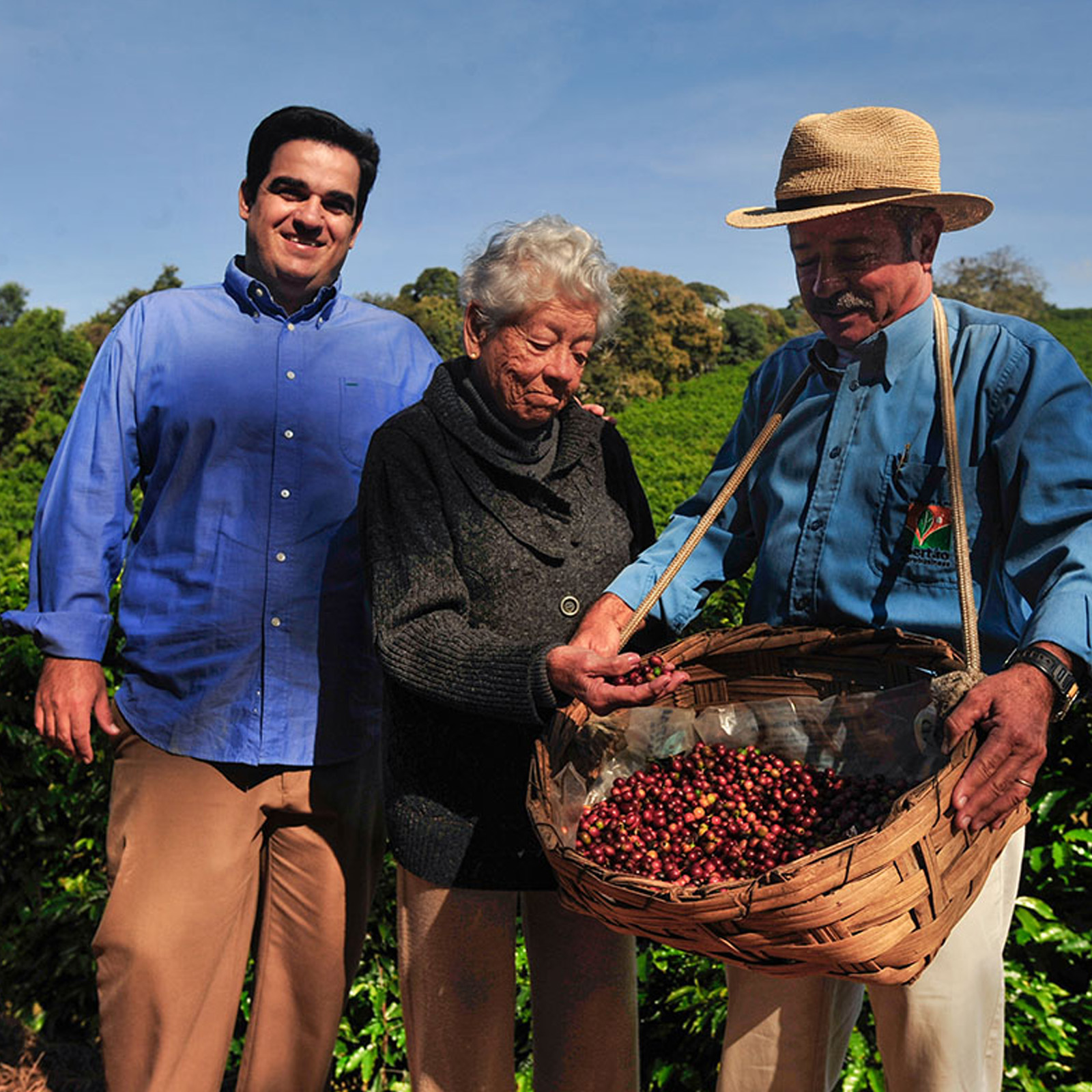
Location: Carmo de Minas
Altitude: 1.100m ~ 1.450m
Processing Method: Naturals, Pulped Naturals
Fazenda Sertão has been among the CoE winners several times. It is an 850-hectare farm of which 330 hectares planted in coffee of several varieties, including Red and Yellow Bourbon, Yellow Catucai, and Yellow Catuai. The farm also grows bananas and corn and is used to raise dairy livestock.
This farm has a lovely story behind it: Among the first generation of coffee growers in this area was Jose Isidro Pereira, a dentist-turned coffee producer who inherited Fazenda Sertão from his mother when she passed away - an incident that ended his dentistry career but put him on a path to coffee farming.
In 1949, Jose Isidro met the "love of his life," Nazareth, who continued to run the farm her husband left in her care. Nazareth and Jose Isidro's children - Francisco, Luiz Paulo, Clycia, and Sandra - are also coffee producers, carrying on the family tradition.
Families of employees reside in houses that belong to the farm, at no cost. All the houses have running drinking water and electricity, and the employees receive in addition to their salaries, milk, coffee, transportation and medicines. There is a municipal public school in the farm. It is also included in the Family Health Program maintained by the government. Furthermore, there is a telephone line for the employees, a soccer/multi-sport field and a fish-farming reservoir, where they can fish.
Well known for its mineral water springs, the Mantiqueira Mountain Range region where Fazenda Sertão is located has a perfect combination of factors such as climate, soil and high altitude to produce excellent coffees.
Those natural factors plus the owners and managers love for coffee cultivation, guarantee the production of fine coffees. Some typical tasting notes are: intense sweetness, good body and average to high acidity, in which citric acidity predominates.
The coffee of Fazenda Sertão is picked manually, because of the topography of the farm, and on cloth for the beans not to touch the soil.
Cup of Excellence Finalist: 2002 / 2005 / 2006 / 2008 / 2010 / 2017 / 2018 / 2019
Altitude: 1.100m ~ 1.450m
Processing Method: Naturals, Pulped Naturals
Fazenda Sertão has been among the CoE winners several times. It is an 850-hectare farm of which 330 hectares planted in coffee of several varieties, including Red and Yellow Bourbon, Yellow Catucai, and Yellow Catuai. The farm also grows bananas and corn and is used to raise dairy livestock.
This farm has a lovely story behind it: Among the first generation of coffee growers in this area was Jose Isidro Pereira, a dentist-turned coffee producer who inherited Fazenda Sertão from his mother when she passed away - an incident that ended his dentistry career but put him on a path to coffee farming.
In 1949, Jose Isidro met the "love of his life," Nazareth, who continued to run the farm her husband left in her care. Nazareth and Jose Isidro's children - Francisco, Luiz Paulo, Clycia, and Sandra - are also coffee producers, carrying on the family tradition.
Families of employees reside in houses that belong to the farm, at no cost. All the houses have running drinking water and electricity, and the employees receive in addition to their salaries, milk, coffee, transportation and medicines. There is a municipal public school in the farm. It is also included in the Family Health Program maintained by the government. Furthermore, there is a telephone line for the employees, a soccer/multi-sport field and a fish-farming reservoir, where they can fish.
Well known for its mineral water springs, the Mantiqueira Mountain Range region where Fazenda Sertão is located has a perfect combination of factors such as climate, soil and high altitude to produce excellent coffees.
Those natural factors plus the owners and managers love for coffee cultivation, guarantee the production of fine coffees. Some typical tasting notes are: intense sweetness, good body and average to high acidity, in which citric acidity predominates.
The coffee of Fazenda Sertão is picked manually, because of the topography of the farm, and on cloth for the beans not to touch the soil.
Cup of Excellence Finalist: 2002 / 2005 / 2006 / 2008 / 2010 / 2017 / 2018 / 2019
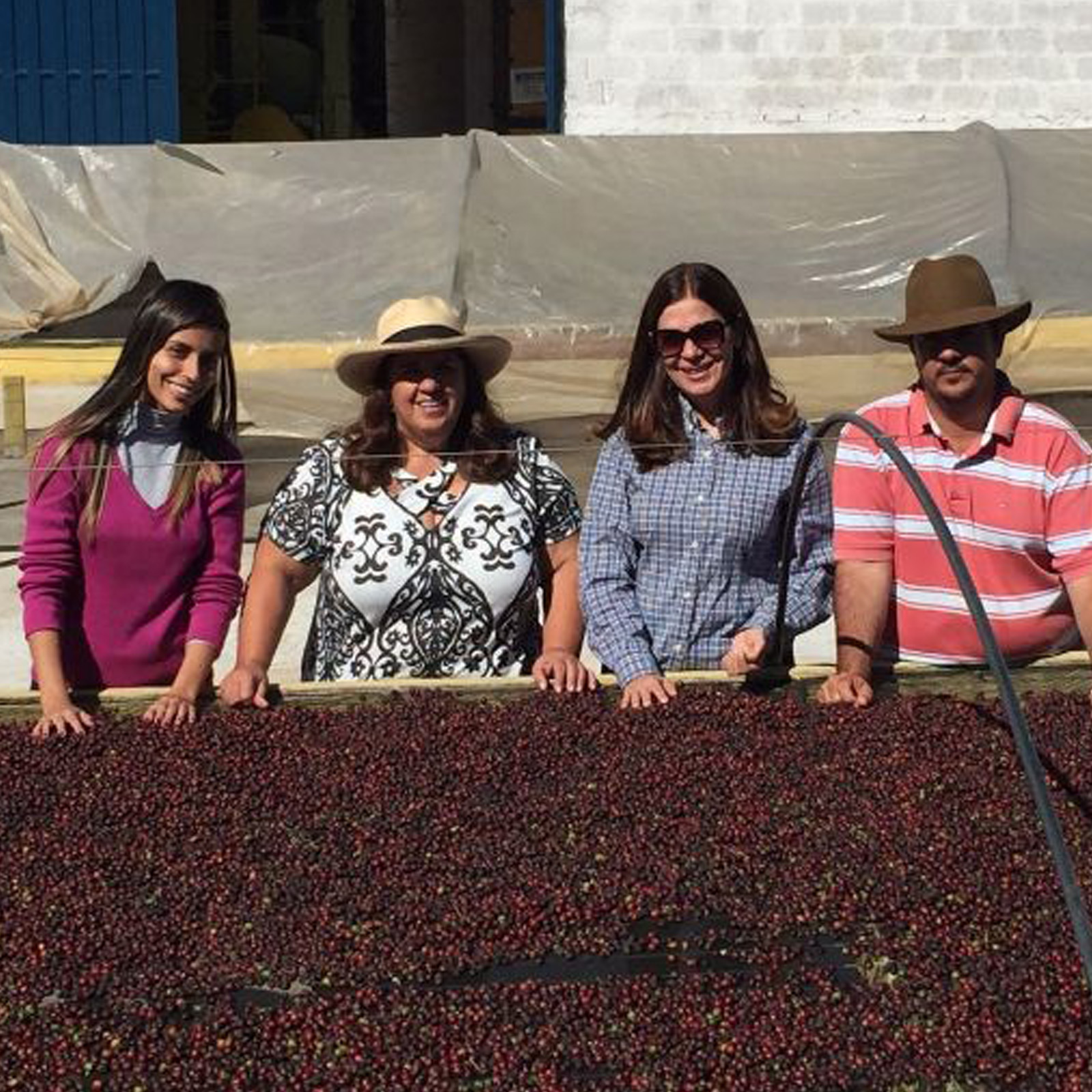
Location: Carmo de Minas
Altitude: 1.075m ~ 1.129m
Processing Method: Naturals, Pulped Naturals and New Flavors Project ®
Fazenda Irmãs Pereira is a 250-hectare farm of which 120 are planted with coffee of several varieties, including Yellow Icatu, Yellow Catuaí, Yellow Catucaí, Acaiá, Mundo Novo and Yellow Bourbon.
Antônio Andrade Pereira Filho and Maria da Conceição Costa Pereira decided to invest on coffee growing in Carmo de Minas in early 1970s. They bought 90 acres of land and started to plant the first seedlings. While those trees grew, the two daughters of the couple were born: Maria Valéria and Maria Rogéria.
The sisters started helping the father to run the farm at a very early age. When they got married, their husbands came to join forces on their wives common mission. When the father died, the sisters decided not to split, but to make their union even stronger. Therefore, they changed the name of the farm from Serrado to Irmãs Pereira (Pereira Sisters, in English) to seal the spirit of sisterhood.
Altitude: 1.075m ~ 1.129m
Processing Method: Naturals, Pulped Naturals and New Flavors Project ®
Fazenda Irmãs Pereira is a 250-hectare farm of which 120 are planted with coffee of several varieties, including Yellow Icatu, Yellow Catuaí, Yellow Catucaí, Acaiá, Mundo Novo and Yellow Bourbon.
Antônio Andrade Pereira Filho and Maria da Conceição Costa Pereira decided to invest on coffee growing in Carmo de Minas in early 1970s. They bought 90 acres of land and started to plant the first seedlings. While those trees grew, the two daughters of the couple were born: Maria Valéria and Maria Rogéria.
The sisters started helping the father to run the farm at a very early age. When they got married, their husbands came to join forces on their wives common mission. When the father died, the sisters decided not to split, but to make their union even stronger. Therefore, they changed the name of the farm from Serrado to Irmãs Pereira (Pereira Sisters, in English) to seal the spirit of sisterhood.
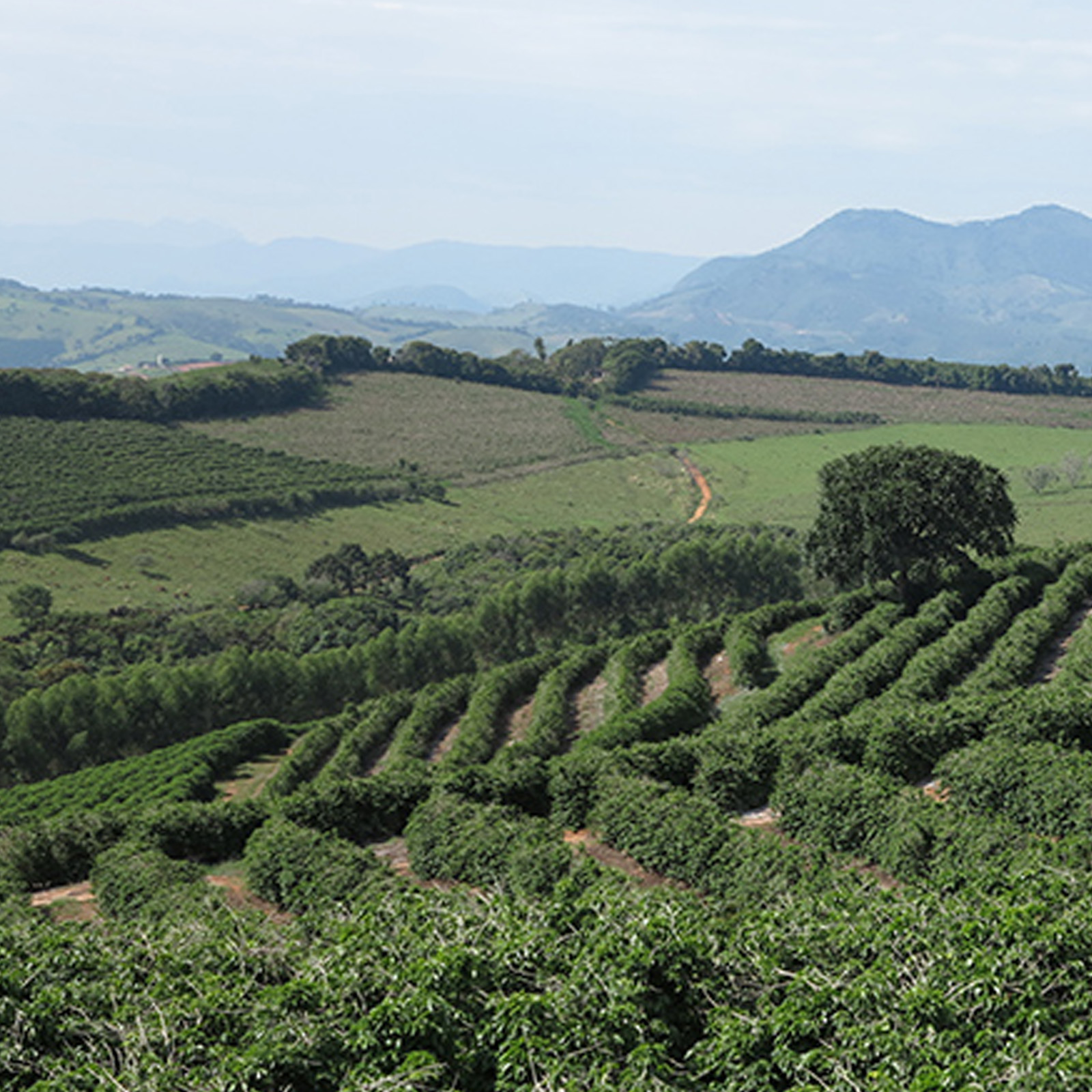
Location: Carmo de Minas
Altitude: 1.100m ~ 1.300m
Processing Method: Naturals, Pulped Naturals
Fazenda Capim Seco is a 40-hectare farm of which 35 are planted with coffee of several varieties, including Yellow Bourbon, Acaiá, Icatu and Yellow Catuaí.
Sitio Capim Seco is owned and operated by Hafael Dias Pereira, who comes from a long line of coffee producers: His grandparents Isidro and Nazareth Pereira were among the first coffee producers in the region, and Rafael’s mother and aunt own the nearby Fazenda Irmãs Pereira.
Since Sitio Capim Seco is relatively small (35 hectares of coffee - large for the rest of the world but small by Brazilian standards), Rafael uses the equipment and facilities at Fazenda Irmãs Pereira to process his coffee. There, he dries his cherry on raised beds or patios, and he produces both Naturals and Pulped Naturals. He has even tried some experimental processes like Black Honey.
“Coffee is what makes my family stay tightly bonded, up since the past until nowadays,” Rafael says. If we want to honor its influence on our lives and history, we must have in mind to keep the hard work we’re used to employ in our tasks in order to produce, consistently, the finest coffees possible.”
Altitude: 1.100m ~ 1.300m
Processing Method: Naturals, Pulped Naturals
Fazenda Capim Seco is a 40-hectare farm of which 35 are planted with coffee of several varieties, including Yellow Bourbon, Acaiá, Icatu and Yellow Catuaí.
Sitio Capim Seco is owned and operated by Hafael Dias Pereira, who comes from a long line of coffee producers: His grandparents Isidro and Nazareth Pereira were among the first coffee producers in the region, and Rafael’s mother and aunt own the nearby Fazenda Irmãs Pereira.
Since Sitio Capim Seco is relatively small (35 hectares of coffee - large for the rest of the world but small by Brazilian standards), Rafael uses the equipment and facilities at Fazenda Irmãs Pereira to process his coffee. There, he dries his cherry on raised beds or patios, and he produces both Naturals and Pulped Naturals. He has even tried some experimental processes like Black Honey.
“Coffee is what makes my family stay tightly bonded, up since the past until nowadays,” Rafael says. If we want to honor its influence on our lives and history, we must have in mind to keep the hard work we’re used to employ in our tasks in order to produce, consistently, the finest coffees possible.”